COURSE INSTRUCTORS:

Doina Azoicai, MD, PhD
Epidemiologist, Professor, Department of Public Health and Epidemiology
Coordinator of the Oncogenetics Department
Director of Centre d’Enseignement et de Ressources en Epidémiologie Clinique Iași (CEREC Iași) – RECIF (Réseau d’Epidémiologie Clinique International Francophone)
University of Medicine and Pharmacy “Grigore T.Popa” Iasi
Coordinator of the Department of Prevention of Healthcare Associated Infections.
Institute of Cardiovascular Disease Iasi
doina.azoicai@umfiasi.ro

Raluca Balan, MD, PhD
Pathologist, MD
Associate Professor Department of Morphofunctional Sciences I – Histology
University of Medicine and Pharmacy “Grigore T. Popa” Iasi
Anatomic Pathology Service
Clinical Hospital of Obstetrics and Gynecology “Elena Doamna” Iasi
raluca.balan@umfiasi.ro
 Valeriu Aurelian Chirica, PhMD
Valeriu Aurelian Chirica, PhMD
Epidemiologist
Assistant Professor , Department of Public Health and Epidemiology
University of Medicine and Pharmacy “Grigore T.Popa” Iasi
valeriuchirica@umfiasi.ro
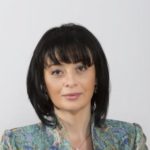
Daniela Druguş
PhD Economist manager
Associate Professor Department of Health Economics University of Medicine and Pharmacy “Grigore T. Popa” Iasi 16, Universitatii Street, Iasi, Romania
Medical Manager “Arcadia” Hospital, 2, Cioarei Street, Iasi, Romania
daniela.drugus@umfiasi.ro
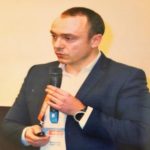
Bogdan Gafton, MD, PhD
Medical Oncologist
Assistant Professor Department of Medical Oncology
University of Medicine and Pharmacy “Grigore T.Popa” Iasi 16, Universitatii Street, Iasi, Romania
Regional Institute of Oncology, Iasi 2-4 General Berthelot Street, Iasi, Romania
gaftonbogdan@umfiasi.ro

Cristina Gavrilovici
Pediatrics and Medical ethics
Professor, MD, PhD “Mother and Child” Department
President of “Grigore T. Popa” University Ethics Committee
University of Medicine and Pharmacy “Grigore T.Popa” Iasi, 16, Universitatii Street, Iasi, Romania
cri.gavrilovici@umfiasi.ro

Eusebiu Vlad Gorduza
Medical Geneticist
Professor Department Medical Genetics
University of Medicine and Pharmacy “Grigore T.Popa” Iasi
Coordinator of the Prenatal Cytogenetics Laboratory
Clinical Hospital of Obstetrics and Gynecology “Cuza Vodă” Iasi
eusebiu.gorduza@umfiasi.ro
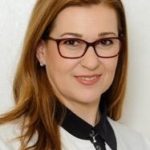
Mihaela Grigore
Gynecologist
Professor “Mother and Child” Department
Coordinator of the “Mother and Child” Department
University of Medicine and Pharmacy “Grigore T.Popa” Iasi
Clinical Hospital of Obstetrics and Gynecology “Cuza Vodă” Iasi
mihaela.grigore@umfiasi.ro
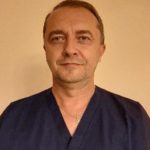
Cristian Lupascu
General Surgeon
Professor, Department of Surgery
University of Medicine and Pharmacy “Grigore T.Popa” Iasi 16, Universitatii Str, Iasi, Romania
Emergency County Hospital «Sf. Spiridon» Iasi 1, Independentei Bld, Iasi, Romania
cristian.lupascu@umfiasi.ro

Corina Lupascu-Ursulescu
Radiologist
Associate Professor, Department of Surgery, Discipline of Radiology and Medical Imaging
University of Medicine and Pharmacy “Grigore T. Popa” Iasi; 16, Universitatii Street, Iasi, Romania
Emergency County Hospital “Sf. Spiridon” Iasi 1, Independentei Bld.,Iasi, Romania
corina.ursulescu@umfiasi.ro
 Catalina Mihai
Catalina Mihai
Gastroenterologist
Associated Professor Internal Medicine – Gastroenterology Department, University of Medicine and Pharmacy “GrigoreT.Popa” Iasi
Hospital “Sf. Spiridon”, Institute of Gastroenterology and Hepatology, Iasi
catalina.mihai@umfiasi.ro
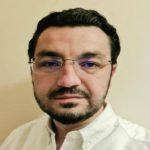
Mihai Marinca
Medical Oncologist
Assist. Professor, Department Medical Oncology
Lecturer / Senior Consultant
University of Medicine and Pharmacy “Grigore T.Popa” Iasi 16, Universitatii Street, Iasi, Romania
Regional Oncology Institute Iasi 2-4, street Gen. Henri Mathias Berthelot, Iasi, Romania
mihai.marinca@umfiasi.ro
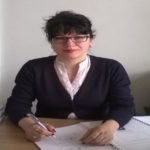
Mioara Calipsoana Matei
Epidemiologist
Associate Professor, Department of Public Health and Epidemiology
University of Medicine and Pharmacy “Grigore T.Popa” Iasi 16, Universitatii Street, Iasi, Romania
Coordinator of the Department of Prevention of Healthcare Associated Infections
Military Emergency Clinical Hospital Iasi 7-9, Berthelot Henri Mathias Street, Iasi, Romania
mioara.matei@umfiasi.ro

Lucian Miron
Medical Oncologist
Professor in Medical Oncology Department
University of Medicine and Pharmacy “Grigore T.Popa” Iasi 16, Universitatii Street, Iasi, Romania
Head of Medical Oncology Department
Oncologic Regional Institute Iasi 2-4 General Berthelot Street, Iasi, Romania
lucian.miron @umfiasi.ro

Aliona Morariu, PhD
Biologist
Biologist at Oncogenetics Department, Iasi
University of Medicine and Pharmacy “Grigore T.Popa” Iasi 16, Universitatii Street, Iasi, Romania
alionamorariuu@yahoo.co.uk

Lucian Negura
Molecular Biologist
Associate Professor, Immunology Department
Responsible of Molecular Oncogenetics Laboratory, UMF Iași
University of Medicine and Pharmacy “Grigore T.Popa” Iași 16, Universității Street, Iași, Romania
lucian.negura@umfiasi.ro

Roxana Postolica
Clinical Psychologist , Psychotherapist
Regional Oncology Institute, Iasi 2-4, Gral Berthelot Street, Iasi, Romania
roxana.postolica@yahoo.com

Cristina Preda
Endocrinologist
Professor Department of the Endocrinology
Coordinator of the Endocrinology Department UMF Iasi
University of Medicine and Pharmacy “GrigoreT.Popa” Iasi 16, Universitatii Street, Iasi, Romania
Emergency County Hospital “Sf. Spiridon” Iasi 1, Independentei Bld.,Iasi, Romania
cristina.preda@umfiasi.ro

Iulian Radu
General Surgeon
Lecturer , Department of Surgery
University of Medicine and Pharmacy “Grigore T. Popa” Iasi 16, Universitatii Street, Iasi, Romania
Head of First Surgical Unit
Regional Institute of Oncology Iasi 2-4 General Berthelot Street, Iasi, Romania
iulian.radu@umfiasi.ro

Gabriela Stefanescu
Gastroenterologist
Associate Professor Internal Medicine – Gastroenterology, Department
University of Medicine and Pharmacy “Grigore T. Popa” Iasi 16, Universitatii Street, Iasi, Romania
Hospital “Sf. Spiridon”, Institute of Gastroenterology and Hepatology, Iasi 1, Bd. Independentei, Iasi, Romania
gabriela.stefanescu@umfiasi.ro
CONTRIBUTORS
| ROMANIA | Florentina NAE
Gabriela TOADER Mădălina – Elena ARGĂSEALĂ Magdalena Maria MICU Irina GHEORGHIU Stefan COLIBABA Doina SPIȚĂ Maria Elza Floarea GHEORGHIU |
| FRANCE | Yves-Jean BIGNON
Mathilde GAY-BELLILE Mathias CAVAILLE Marina GILARDEAU Mathis LEPAGE |
| BULGARIA | Nonka MATEVA
Ivan NOVAKOV Radka MASSALDJIEVA Vili STOYANOVA Hristo IVANOV Jana MLADENOVA |
| HUNGARY | Farkas ANDRÁSNÉ
Zita BORBÉNYI Zsuzsanna LÁSZLÓ Anikó GÁRGYÁN Zsuzsanna HORVÁTH-GÁRGYÁN |
